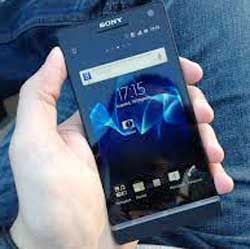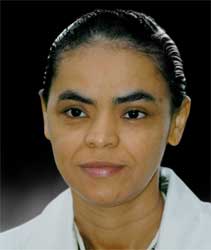
In Brazil, where the explosion of smartphones is putting a new twist on next month's elections, there's an app for that.
Mass Internet access is reshaping the campaign for the presidential, congressional and state polls in Brazil, where more than 100m people or half the population are now online.
Smartphone sales rose 47% in the first half of the year, according to a market survey by research firm Nielsen-Ibope, and 30% of Brazilians now own smartphones.
And while good old-fashioned rallies and posters are still the main campaign tools, a host of new mobile applications is changing the way voters get news, pick candidates and talk politics.
One popular election app is "Voto vs Veto," an app inspired by popular dating app Tinder that aims to help users find the right presidential candidate.
The program presents users with candidates' campaign pledges, with no name attached, and asks them to "vote for" or "veto" them.

After the user clicks on one of the two buttons, the candidate's name appears. With enough clicks, users are supposed to find their political soulmates.
The app is programmed with the official platforms of all 11 presidential candidates and provides statistics on how many times each statement has been voted for or against.
The app has been downloaded by 100,000 users. It was developed by computer science student Walter Nogueira, who said he expects more apps like it in future.
"Mobile apps related to politics are still in their infancy in Brazil," he told AFP. "But they're growing."
Another popular application called "Dirty Slate" tells users which candidates have criminal records - helpful information for voters in this country tired of corruption scandals.
Its name is a play on the so-called "Clean Slate" law passed in the run-up to the October polls, which has blocked 250 would-be candidates from running because of past corruption cases.
Another app lets users check candidates' official asset declarations. Yet another lets them throw virtual tomatoes at their faces.

Even the country's Supreme Electoral Tribunal has launched an app, giving users easy access to data on all 26,156 candidates.
With so many choices, voters may need help keeping everything straight. So news portal UOL developed an app to store the ballot numbers of users' preferred candidates, as well as delivering election news, poll numbers and politician profiles.
For voters who dream of taking a selfie with presidential contender Marina Silva, the popular environmentalist whose late entry into the race has rattled incumbent Dilma Rousseff's re-election campaign, her coalition has launched an app to Photoshop yourself into a picture alongside her.
Third-place presidential candidate Aecio Neves's Social Democratic Party has also launched an app delivering campaign news and videos.
The mobile revolution is giving a new political voice to young voters in Brazil, where the minimum voting age is 16. Nearly 40% of voters or 56.3m people are aged between 16 and 34. That demographic also owns 55% of the country's smartphones, according to a Nielsen study sent to AFP.
But smartphone use is still mainly limited to educated and middle- or upper-class social groups - part, but not all, of the demographic that took to the streets in mass protests last year calling for better education, health and transport.
To cast a wider online net, the top candidates have social media teams to reach the tens of millions of Brazilians who use social networks.
The sprawling South American country ranks third in the world in terms of Facebook users (76m) and second in the world in Twitter users (41m).
On Facebook, meanwhile, the three top candidates each have more than a million followers.
Source: AFP via I-Net Bridge

For more than two decades, I-Net Bridge has been one of South Africa’s preferred electronic providers of innovative solutions, data of the highest calibre, reliable platforms and excellent supporting systems. Our products include workstations, web applications and data feeds packaged with in-depth news and powerful analytical tools empowering clients to make meaningful decisions.
We pride ourselves on our wide variety of in-house skills, encompassing multiple platforms and applications. These skills enable us to not only function as a first class facility, but also design, implement and support all our client needs at a level that confirms I-Net Bridge a leader in its field.
Go to: http://www.inet.co.za